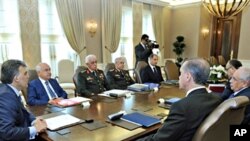After more than a quarter of century of fighting between the Kurdistan Workers Party, or PKK, and the Turkish state, major efforts are in place to end the conflict. Last week the PKK announced a one month extension to its ceasefire and senior Turkish ministers have been in talks with the Iraqi Kurdish leadership. But a long and difficult road remains to achieving peace.
Looking for a Solution
The Kurdish rebel group has been fighting the Turkish state for increased rights for Kurds for nearly 30 years. The conflict has claimed nearly 40,000 lives. But observers say leaders on both sides now seem increasingly eager to resolve the conflict peacefully.
Last week, in his address to the opening of parliament, the Turkish President Abdullah Gul called on deputies to find a solution.
"What we should do today is to develop a civilian will," he said. "We should confront our mistakes in the past and solve the question in a democratic way rather than discussing whether such a question really exists or how it should be defined."
Cease-fire initiated momentum for peace, talks
The momentum for peace has accelerated since the PKK announced a cease-fire in August, a month before a referendum on government reforms to Turkey's constitution.
The government responded by sending state officials to meet with the leader of the PKK, Abdullah Ocalan, who is being held in a Turkish jail.
Meanwhile senior government members held talks with the Kurdish leadership in neighboring Iraq.
One of the leading members of Turkey's legal Kurdish movement, Ahmet Turk, says there is a unique opportunity for peace.
"If you ask both Kurds and Turks, this is the time for a solution. If there is no resolution there will be more pain," he said. "We need a road map for the process for peace for which steps should be taken; what policies should be followed." He says the key demands of the Kurdish movement include "local autonomy, constitutional recognition for Kurdish identity, and Kurdish education in schools."
But political scientist Cengiz Aktar of Bahcesehir University says even though many demands are in the interest of the whole country there is little political movement.
"Even for a better administrative efficiency we need to have a sort of decentralized system now and there is hardly any debate about it," Aktar said. "The debate was started by the Kurds and I hope it won't remain there and it will become a national debate. You know the definition of citizenship, the Turkishness, Kurds challenge this. And the definition of the language the unique language of Turkey is Turkish, so it can't be so."
Erdogan dismisses out of hand idea
In fact, last week Prime Minister Recep Tayyip Erdogan dismissed out of hand the idea of Kurdish education and on Monday he ruled out a new constitution until after next year's general election.
Yasmin Congar, deputy editor of the Turkish daily Taraf, explains the connection between the constitution and the election.
"They have among their voters Turkish nationalists who are not very much supporting the democratic efforts in the southeast in the Kurdish region," said Congar. "But they also have votes from the Kurds, so its a very fine line they have to walk. I don't think there can be a full solution before the general election."
The prime minister's tough stance is seen by some as a possible reason the PKK only extended its ceasefire by a month instead of the widely expected eight months.
But Ahmet Turk warns that the continuation of the ceasefire will depend partly on the reaction of the Turkish army.
"If the army operations continue and the ceasefire is ignored," he says, "it will not only cause grave harm to Kurds but to the whole Turkish public."
Military operations avoided
For the last few weeks the army appears to have avoided any major operations against the separatists.
But analysts say its not only the army that poses a threat. Last week 25 leading members of the main legal Kurdish party, the Peace and Democracy Party, or BDP, were arrested and accused of having links to the PKK. Nearly 2,000 BDP members are currently being held.
Critics claim the arrests benefit the prime minister and his Justice and Development Party ahead of the general election, as its weakens the BDP – the ruling party's main rival in the predominantly Kurdish southeast.
While observers say there is a feeling Turkey has its best opportunity for peace in decades, with the country going to the polls in less than a year, there's also a fear that election politics could yet destroy those hopes.













